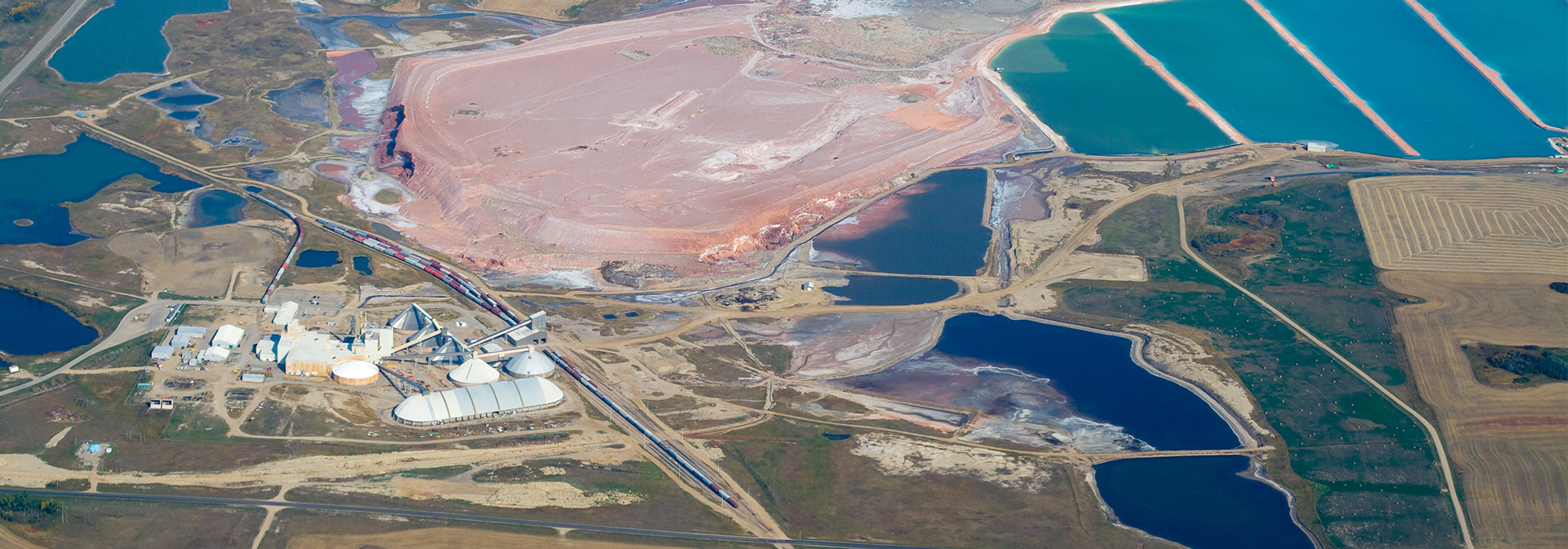
The major role that potash plays in Saskatchewan politics was evidenced in 1975 when my husband, Peter, and I were moving to the province: as soon as our car crossed the Manitoba-Saskatchewan border the radio was virtually saturated with industry ads condemning the recent decision by the government of Premier Allan Blakeney to nationalize potash companies. The issues at stake in the 1975 dispute between the potash companies and the Blakeney government help to explain why the current Saskatchewan government of Premier Brad Wall rejected the hostile bid by Australian mining giant BHP Billiton (BHP) to take over PotashCorp of Saskatchewan (PCS). And the decision by the federal government to deny what would have been the largest takeover in Canadian history raises interesting questions about the issues that need to be addressed when future takeovers are considered.
The immediate issue in the 1975 dispute was taxation. The potash companies opposed the government’s new reserve tax but refused to “open their books” to show why the tax was too onerous. Instead, they threatened to close mines, which would result in layoffs and revenue losses to the government; they launched court action and they engaged in a very high profile and costly public battle with the government on the eve of the 1975 provincial election (the government was re-elected but lost seats).
The underlying issue was conflicting views about the role of government and the private sector in the development of Saskatchewan’s natural resources. From the perspective of the potash companies, they owned the companies and therefore had the right to develop the resource so as to maximize their profits. That view overlooked the long public battles that had occurred in Saskatchewan and Alberta over natural resources. When the provinces were created in 1905 they were not given control over their natural resources and won that control only in 1930 after a long public battle with the federal government. Hence, Saskatchewan governments of all political stripes have taken the position that natural resources like potash belong to the people of the province and when they are depleted the companies have to pay fair compensation to the government (royalties and taxes) to help finance social and other programs. Also, Saskatchewan governments have seen resources like potash as strategic assets that have to be developed in ways that advance the government’s overall economic development objectives — in the 1970s diversifying the economy beyond agriculture — and to do so governments have to play a role in setting the framework for resource development.
The 1975 dispute also showed the extent to which private companies could effectively undermine the province’s power to control the development of natural resources by closing mines and taking on the government in the political realm. Gridlock and the layoffs and revenue losses that would result would be significant problems for any government.
Nationalizing potash was controversial; however, it did consolidate a major part of the industry in one company, and when PCS was privatized in the 1980s it continued to operate in ways that were consistent with the overall fiscal and strategic interests of the province. The provincial objective of maintaining a fair and reliable return to taxpayers from the mining of potash was met by PCS’s support for Canpotex, the consortium that markets, transports and sells the potash produced by PCS , Agrium and Mosaic, the two other potash companies in the province. As the dominant player in the industry, PCS in conjunction with Canpotex and the other potash companies has acted as a “swing producer” in the marketplace, with the goal of restricting supply when necessary to minimize price volatility and keep prices as high as possible.
Had the leadership of BHP studied the politics of potash in Saskatchewan it might have avoided the serious strategic mistakes that cost it the support of the Wall government for its takeover bid. Of critical importance is the fact that the Wall government has repeatedly declared that Saskatchewan is open for business; it has assiduously pursued opportunities to develop and diversify the economy of the province, and its initial reaction to the proposed takeover ranged from neutral to positive. For a government focused on economic development, the proposed takeover was seen as an opportunity, and some government ministers openly supported the principle that the takeover decision should be made by the marketplace, not the government.
Whatever enthusiasm the government may have had for the takeover began to wane when the leadership of BHP stated that it intended to withdraw from Canpotex, raising the prospect that the company would adopt a high-volume strategy that would lead to lower and more volatile prices for potash. The Conference Board of Canada, in a study commissioned by the Saskatchewan government, ran a “high-production” scenario and concluded that it posed a “serious risk to the province” and would cost the province $5.7 billion in taxes and royalties over a ten-year period. The cost of withdrawing from Canpotex would reach beyond Saskatchewan’s borders. Rather than using the infrastructure established by Canpotex to move potash by rail to British Columbia ports, BHP proposed to use American port facilities.
Had the leadership of BHP studied the politics of potash in Saskatchewan it might have avoided the serious strategic mistakes that cost it the support of the Wall government for its takeover bid.
The Conference Board study also quantified the other costs to the province of the proposed takeover. BHP had already done preliminary work on a new mine, Jansen Lake, and the capital costs of that mine could be written off against current income generated by PCS properties at an estimated cost to the Saskatchewan Treasury of $200 million per year. These initial costs would be offset by the construction and operation of the Jansen Lake mine, but the benefits would not be fully realized until after 2020. As well, BHP could deduct its debt servicing costs for the PCS acquisition against the taxable income of PCS operations, resulting in lower federal and provincial corporate tax. In total, the losses to the Treasury from the takeover were estimated to be equivalent to about 7 percent of the province’s annual revenu
The problems associated with BHP’s position that it would withdraw from Canpotex were compounded when the company missed a clear signal from the Saskatchewan government. The day after BHP officials stated their reluctance to join Canpotex, Premier Brad Wall expressed the government’s strong support for Canpotex. The signal was that the government saw potash as a provincial resource that had to be developed in ways that were consistent with the overall fiscal and economic needs of the province. Oblivious to the gathering storm clouds, Billiton proceeded on its assumption that once it owned PCS it would develop the resource in a way that met the company’s objectives, with little concern for the fiscal and economic interests of the province.
In retrospect, the turning point in the ill-fated bid occurred on September 20, about one month after the takeover attempt became public, when Premier Wall had his first face-to-face meeting with BHP’s CEO, Marius Kloppers. The delay in meeting with Wall can be explained by several factors. Kloppers and his team had focused on the federal scene, assuming that the decision on the takeover would be made by Investment Canada and the Prime Minister’s Office. Moreover, the lowball bid of $130 per share infuriated PCS, which launched court action against BHP in the United States and an aggressive campaign against the bid in Canada. Thus, Kloppers and his team were preoccupied by selling its bid proposal to federal officials and PCS shareholders, and they failed to consider the role that might be played by the province.
At the September 20 meeting the province needed to get reassurances about the potentially negative fiscal implications of the proposed takeover and it had to find other economic development opportunities that could justify the change in potash ownership. Kloppers was not able to satisfy the province on either count. Hence, after the meeting, the premier stated that he did not believe that the proposed takeover would meet the Investment Canada test of providing a “net benefit.”
In September 2010 the underlying issue was the same as it had been in 1975: differing views of the role of government in the development of Saskatchewan’s resources. In his statements about Canpotex, Kloppers revealed his view that once PCS was purchased, BHP would run the company and develop the resource according to its own corporate interests. Wall, on the other hand, saw potash as a provincial resource that had to be developed in ways that would bring a fair and consistent return to taxpayers and advance the province’s overall economic development objectives.
As the distance between the two sides widened, the premier stated that if the takeover proceeded, the province would consider levying a potash takeover tax that would have the effect of recouping all of the revenue losses projected in the Conference Board study. Out-of-province editorialists and even the Conference Board authors argued that the province could use its extensive powers over natural resources, including levying taxes, to offset any negative impacts of the takeover. This argument was used by many who supported the takeover bid.
But those who remembered the 1975 dispute were less sanguine. In theory, the province had extensive power over resources, but in practice what would happen if a huge multinational giant like BHP decided, as the much smaller potash companies had in 1975, to “go on strike” to force the government to withdraw its onerous new tax? The prospect of gridlock with shut-in mines, layoffs and lost government revenue was a real and daunting possibility.
As provincial opposition to the takeover bid mounted, Kloppers and his team tried to reverse course and give the province the reassurances and promises of concrete net benefits that it had been seeking in the September 20 meeting. If the takeover proceeded, then BHP promised that it would remain in Canpotex for a period of time and it would structure its company so as to minimize the tax losses to the province. These commitments along with the company’s previous promises to move head office jobs to the province and make significant other investments sounded attractive at face value. But the new commitments were not enough for a government leery of promises made in desperation and fully aware of the problems involved in enforcing such promises.
In urging the federal government to stop the takeover, Wall made the case that potash is a strategic resource. In a world with a declining amount of arable land and a growing number of people eating high-protein diets, potash, as an essential ingredient in fertilizer, is critical to the world’s future food supply.
The single biggest commitment BHP made was to build a massive $12billion new mine at Jansen Lake. However, when pressed by the federal government to give a firm commitment that the mine would be constructed, the company quite rightly argued that sound corporate governance required that its board of directors had to approve the mine and also had to reserve the right at some future date to cancel the project if the economics were no longer positive. Yet, from the point of view of governments, how could a project that depended on such contingencies be considered a net benefit? Moreover, other takeovers had been approved by Investment Canada on the basis of promises or commitments that failed to materialize, particularly in the mining sector. Indeed, since the creation of Investment Canada in 1985, the successive Mulroney, Chretien and Martin governments never turned down a single takeover bid. The first rejection of a takeover occurred in 2007, and it was the current Conservative government that turned down the sale of aerospace icon MDA, makers of the Canadarm, to a US bidder on the grounds that Canada would be losing control of technology it created. In essence, the government invoked the national interest.
In the case of the Potash takeover bid, the heart of the problem was that governments had no effective remedy, beyond court action, to ensure that promises made were promises kept and, as Premier Wall put it, “Promises don’t build schools.”
On October 21 in a speech to a Regina business group, Premier Wall outlined the reasons why his government opposed the proposed takeover of PCS. He argued that the takeover would result in job and revenue losses that were up front and substantial, while the benefits were elusive and in many cases unenforceable. In urging the federal government to stop the takeover, Wall made the case that potash is a strategic resource. In a world with a declining amount of arable land and a growing number of people eating high-protein diets, potash, as an essential ingredient in fertilizer, is critical to the world’s future food supply. Saskatchewan has more than 50 percent of the world’s known reserves of potash and there is no other resource in which Canada is in such a dominant global position. The proposed takeover would mean transferring 25 to 30 percent of the world’s known reserves of potash from a company that specializes in potash and fertilizer to a company that has 100 different mines in 25 countries and for whom potash would represent only 20-25 percent of its business. He wondered aloud, “Will potash become a loss leader for a company that has other things to sell?”
On November 3, the federal government announced its decision to prevent the hostile takeover of PCS by BHP Billiton. Obviously the fact that the Conservative government stood to lose some of the 13 seats out of the 14 seats in Saskatchewan was a major consideration. I also think that it would have been difficult for Prime Minister Stephen Harper to overcall a provincial government that had done its due diligence and was asserting its power to develop its natural resources in a way that was consistent with its best interests. Being from Alberta he would understand the importance of respecting the rights of provinces to control the development of their natural resources; he was, it must be remembered, a strong opponent of the National Energy Program, and the fact that Alberta was the first province to support Saskatchewan’s position would have been noticed by the prime minister. The fact that former Alberta premier Peter Lougheed publicly supported Wall is not insignificant, either. A respected figure in western Canada, and the elder statesman of Alberta Conservatives, Lougheed’s intervention would not have fallen on deaf ears with the prime minister.
There were sound policy reasons why the governments of Saskatchewan and Canada opposed the takeover of PCS. At the same time, the decision to reject the bid has raised important questions that justify a review of Canada’s policies on foreign takeovers. Canada needs more clarity and transparency in its rules with respect to foreign takeovers. The case of potash also raises the important issue about the role that should be played by provinces when the takeover involves a natural resource company. Finally, a critical issue that has to be addressed is how to assess net benefits, when many commitments made by companies cannot be enforced by governments.
Photo: Shutterstock









